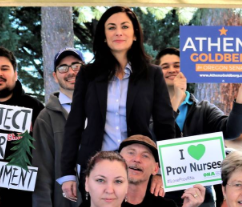Candidate Jenni Neahring puts up a make-or-break advertisement.
Neahring got into the campaign late, and is not as well known as Jamie McLeod-Skinner or Jim Crary.
 |
| Click HERE to go to her website and video. |
It is too late to shake enough hands to win. She needs a powerhouse ad, and the money to get her name and identity out there.
Which one of the seven is she? She is the woman doctor. She seems to be betting that this is enough.
Her campaign created an ad. Click the caption. Here is the verbatim text of the video:
"I've moved to Oregon twenty years ago. Like many of you, I was drawn by Oregon's unique values and way of life. Oregonians are kind and fair. We value rewarding hard work, supporting our families, and coming together to build healthy communities. As a physician and problem solver, I am committed to bringing innovative solutions to the economic, social, and environmental challenges of the 21st century. Help send me to Washington on May 15th. Vote Jenni Neahring for Congress. I'm Jenni Neahring and I approved this message."
There are a succession of images. A viewer of the ad takes them in unconsciously, but by reading them one actually notices what flashed by:
***A Jenni Neahring logo.
***Photo of white-coated Neahring, with stethoscope, talking to an apparent patient or voter.
***Neahring wearing a plaid shirt outdoors in ranch land
***Neahring wearing a tee shirt at playground with young children climbing on play structure
***Hikers, presumably Neahring, on rocky trail
***Flash of Neahring at viewpoint, gazing
***Flash of farmer on John Deere green equipment
***Flash of Neahring listening to white haired man
***Flash of white haired man holding a dog in book lined room
***Flash of Neahring listening to unseen person
***Flash of sparks flying in an apparent foundry or welding shop
***Neahring walking toward camera on a trail, beside white haired man
 |
| Neahring outdoors |
***Neahring walking toward camera on a trail, beside white haired man--close up shot
***Neahring in close-up, wearing white coat, looking interested and concerned with apparent patient who is wearing the same plaid shirt as the trail walker, now defining him as a voter, not a patient.
***Neahring in still shot, wearing white doctor's jacket
What did the ad actually say?
The ad copy is noteworthy in being a succession of political happy-talk cliche's. It is unusual only in how undisguised is her platitude sharing. She says Oregonians are kind and fair and they reward hard work, and indeed are uniquely so. Moreover they are special in loving their families and desiring healthy communities. Neahring describes herself is a physician and problem solver for 21st Century problems. Except for her noting she is a physician, every candidate for every office in America, regardless of political party or policy position, could say what she said about their constituency.
What did the ad actually communicate?
 |
| Final image of video |
The ad communicated she was a doctor who lived in the District, and that she was pleasant and well intentioned.
The ad is the equivalent of the initial conversation at a meeting of strangers: smiles, hello-how-are-you, fine, delighted-to-meet-you, more smiles. Such an interaction is utterly anodyne, but it is not without content and meaning. It assures the two parties that the introduced person has no immediate hostile agenda. Everything communicated in the ad is communicated in two photos shown above, the outdoor scene and the final scene of Neahring smiling warmly.
Is the ad useful for getting her elected?
I have some concerns. Theoretically, Neahring has a strong case that she is the most electable of the seven candidates. As a physician she has presumed authority on the issue with the strongest case against Walden. Her focus issue has more salience to voters than does Crary's process issue, campaign finance reform. Jamie McLeod-Skinner's overall "story" is more unusual and mentally "sticky" but Neahring's is more relatable and easier to describe succinctly, "the woman doctor."
My concern comes from the fact that the advertisement is so vey forgettable. The most interesting thing about it is the improbable flattery that Oregonians are by nature kind and fair. When one meets a stranger and engages in the hello-how-are-you-fine-and-you routine, reflect on how often one immediately forgets the name of the person one met. Such interactions are pleasant but forgettable. Just like the ad.
I consider campaign speeches and brochures that say essentially nothing meaningful to be wastes of money and opportunity. I consider this ad to be a likely missed opportunity--except for one possible silver lining.
There are seven candidates, all of them plausible in one way or another, and all have essentially the same political point of view. It is confusing for voters. Too many choices. The advertisement does communicate one very simple thing about one very simple brand. She is the woman doctor.
That identity does not give anyone a reason to replace Walden with her, but it does make her identifiable within the seven. That may be enough for the May election.































